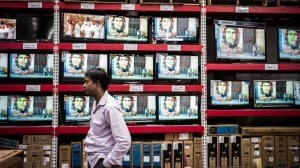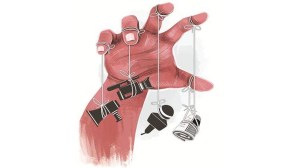Destination US: Only visa power
If anti-Americanism is on the rise around the world, no one told the kids in the student visa line at the US Embassy in Beijing. The quest a...

If anti-Americanism is on the rise around the world, no one told the kids in the student visa line at the US Embassy in Beijing. The quest among Chinese students for visas to study in America, say US Embassy officials, has become so intense that it has spawned Internet chat rooms, where Chinese students swap stories about which arguments work best with which US consular officials.
Just how closely Chinese students strategise over the Internet on how to get visas to America 8212; at a time when fewer are being given for security reasons 8212; was revealed to the embassy recently when on one day one consular officer had scores of students come through with the same line, which some chat room had suggested would work: 8216;8216;I want to go to America to become a famous professor.8217;8217; After hearing this all day, he was surprised to get one student who came before him and pronounced, 8216;8216;My mom has an artificial limb and I want to build a better artificial leg for my mom and that is why I want to study in the US.8217;8217; The consular officer was so relieved to hear a new line that he told the young man: 8216;8216;You know, this is the best story I8217;ve heard this morning. I really salute you. I8217;m going to give you a visa.8217;8217;
You guessed it. The next day every other student who showed up at the embassy said he or she wanted to go to America to learn how to build 8216;8216;a better artificial limb for my mother8217;8217;.
Hearing stories like this, you have to wonder: Are Bush officials right when they dismiss all of this talk that President Bush has made America more unpopular in the world now than at any other time in post-war history? Do people really hate us? Don8217;t those visa lines say otherwise?
To begin with, there are a few 8216;8216;technical8217;8217; reasons why anti-Americanism generally does not have the same edge in Asia as in Europe and the Middle East. Asia8217;s leaders have much more legitimacy than leaders in the Arab world, either because they have come to power through free elections or because they have delivered on their promise of economic growth. Because of that, they don8217;t need to demonise America to deflect their people8217;s anger from them. Also, Asia generally is focused like a laser on economic development 8212; and countries like China see investment and technology transfer from America as critical to their growth.
8216;8216;People in Asia do not hate the US,8217;8217; Singapore8217;s elder statesman, Lee Kuan Yew, said. 8216;8216;Countries like China and India are focused on their economic development, they see in America an enormous well to draw technology and economic growth from.8217;8217;
But here8217;s the problem: Young people want American education and technology more than ever, but fewer want to wear our T-shirts 8212; want to be identified as 8216;8216;pro-American8217;8217;. As one former US diplomat in Beijing put it: 8216;8216;They want to cherry-pick us, not line up with us. We8217;ve lost prestige.8217;8217;
The idea of America as the embodiment of the promise of freedom and democracy 8212; not just of technology and high living standards 8212; is integral to how we think of ourselves, but it is no longer how a lot of others think of us. They are now compartmentalising. The unilateral war in Iraq, the post-war mess there, the walk-away from Kyoto and other treaties, the Abu Ghraib scandal have taken a toll. The idea of US as embodying the charisma of democracy has been damaged. As political theorist Yaron Ezrahi put it, 8216;8216;America as the do-gooder has been hurt, but America as the goods-doer is still there.8217;8217;
Fortunately, this situation is not irreparable. The longing for an America that exports hope, not fear, and that is an example of the best global practices and values, runs really deep in the world. In fact, it is one reason that some people abroad are so angry with President Bush 8212; because they blame him for taking that America away from them. I8217;m convinced a different approach or different administration would elicit a big response from the world. But for now, we will pay a price, because when people want to line up for our visas but not for our policies, it means Americans alone will have to bear the burden and the price of those policies. That is not good for us. When you lose your status as a power with values, you weaken your ability to fight those powers without values.
8212; New York Times
- 01
- 02
- 03
- 04
- 05































